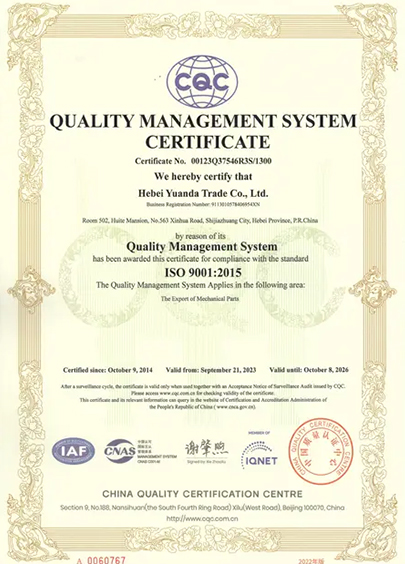Mobile:+86-311-808-126-83
Email:info@ydcastings.com
7.3 compressor housing
Understanding 7.3% Compressor Housing A Key Component in Modern Engineering
In the realm of mechanical engineering and manufacturing, the terminology around components like compressor housing is critical for ensuring efficiency and reliability. The 7.3% compressor housing plays a pivotal role in the functionality of various systems, particularly in automotive and industrial applications. This article explores what compressor housing is, the significance of the 7.3% metric, and its implications for performance.
Understanding 7
.3% Compressor Housing A Key Component in Modern EngineeringThe term 7.3% specifically refers to a performance metric that indicates the efficiency or capability of the compressor housing design. In many contexts, this percentage can relate to various aspects such as pressure loss, weight reduction, or thermal efficiency. Compressors, particularly in the automotive sector, need to maintain high efficiency under varying conditions, and a 7.3% improvement in any of these areas can significantly impact overall performance.
7.3 compressor housing

For example, when engineers focus on reducing weight in compressor housing by 7.3%, it not only lifts the overall efficiency of the vehicle but also contributes to enhanced fuel economy. In industries where performance and energy efficiency are paramount, even small percentages can translate to substantial cost savings and improved environmental impact. Consequently, a compressor housing designed with advanced materials and tailored geometries can lead to such efficiencies.
Moreover, the manufacturing process of compressor housing has evolved with advancements in technology. Techniques such as additive manufacturing and precision machining have enabled the creation of complex geometries that can optimize airflow and reduce turbulence. These manufacturing innovations are vital in achieving that proverbial 7.3% efficiency metric. As industries continue to strive for sustainability, focusing on enhancing components like compressor housing underscores a broader trend of engineering toward greener solutions.
In the automotive sector, for instance, the race for better fuel efficiency and lower emissions drives the demand for innovation in compressor design, where the 7.3% efficiency mark becomes a target for engineers and designers. This commitment to improvement illustrates the intricate relationship between design, performance, and environmental responsibility.
In conclusion, understanding the importance of the 7.3% compressor housing illustrates the meticulous nature of engineering and manufacturing in modern applications. As the industry continues to progress, focusing on these critical metrics will not only enhance performance but also contribute to a more sustainable future. Compressor housings, while often overlooked, are exemplars of how thoughtful design and engineering can lead to meaningful advancements across various fields.
-
Why Should You Invest in Superior Pump Castings for Your Equipment?NewsJun.09,2025
-
Unlock Performance Potential with Stainless Impellers and Aluminum End CapsNewsJun.09,2025
-
Revolutionize Your Machinery with Superior Cast Iron and Aluminum ComponentsNewsJun.09,2025
-
Revolutionize Fluid Dynamics with Premium Pump ComponentsNewsJun.09,2025
-
Optimizing Industrial Systems with Essential Valve ComponentsNewsJun.09,2025
-
Elevate Grid Efficiency with High-Precision Power CastingsNewsJun.09,2025











